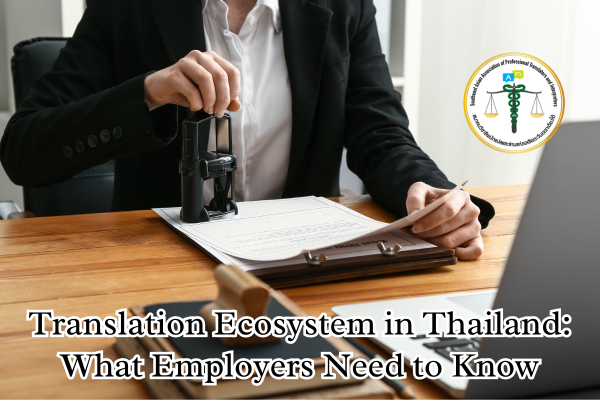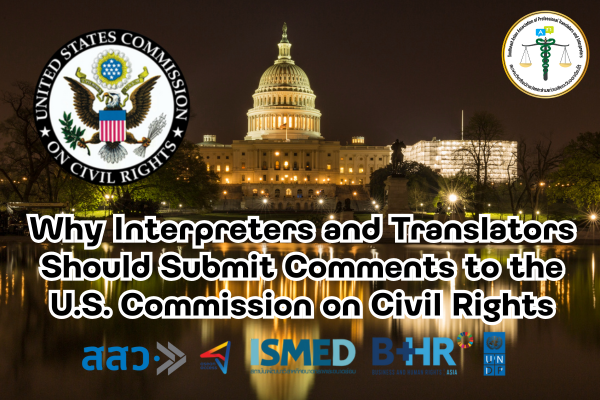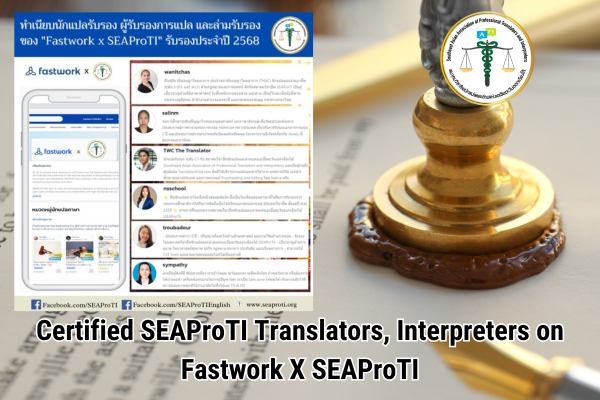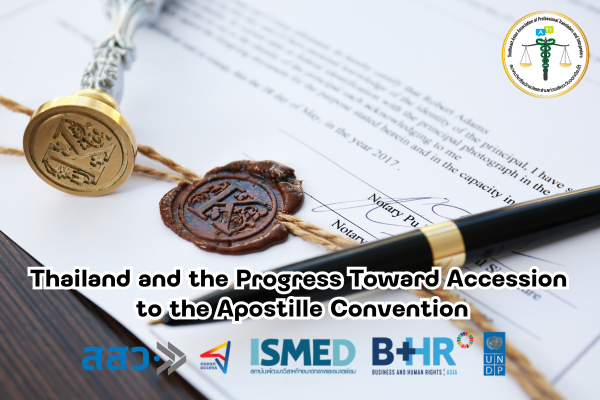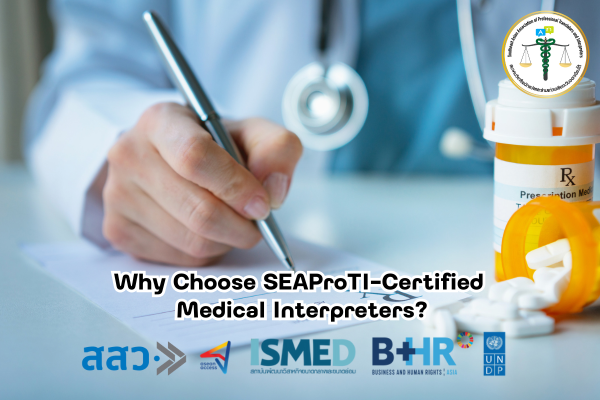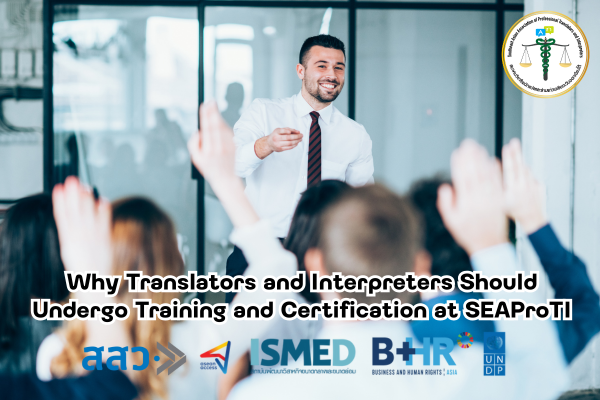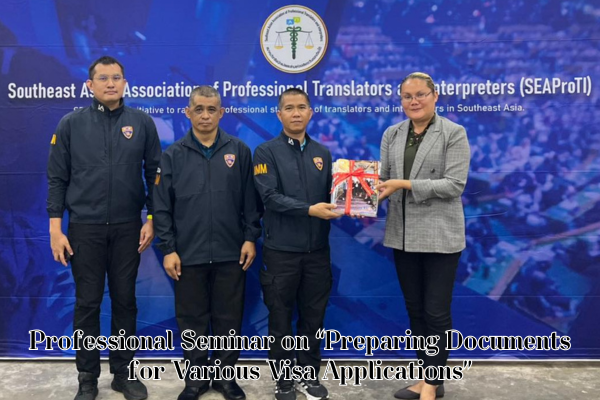Document translation in Thailand is a vital service in business, education, and daily life. However, the ecosystem surrounding translation services in the country remains complex, and many individuals may have misunderstandings about the processes and requirements involved. This article aims to provide a detailed explanation of Thailand’s document translation system, emphasizing the role of the Southeast Asia Professional Translators and Interpreters Association (SEAProTI), which is the primary body certifying translators and translation verifiers in the country. It also includes recommendations for choosing translation services appropriately.
SEAProTI Certification for Translators
The Southeast Asia Professional Translators and Interpreters Association (SEAProTI) was established to set professional standards for translation and interpretation in Thailand and the ASEAN region. It implements rigorous certification processes to ensure the quality and reliability of certified translators, particularly those aiming to provide international-level services.
-
Certification Process
Translators seeking certification from SEAProTI must undergo training, knowledge assessments, and adhere to professional ethics guidelines. This process ensures that certified translators can deliver accurate and comprehensive translations in all aspects, including linguistic and legal contexts. -
Licenses and Professional Cards
Certified translators receive licenses, professional cards, and SEAProTI seals, which serve as proof of the quality of their translations. Documents translated by SEAProTI-certified translators are internationally recognized, especially in countries emphasizing high translation standards such as those in the European Union and Australia. -
The Importance of Certification
Choosing a SEAProTI-certified translator minimizes the risk of errors in translations or rejection by the receiving authority. It also reduces potential costs associated with re-translations or preparing new documents.
Document Certification by Other Agencies
In Thailand, agencies involved in document certification and translation have varying roles and limitations:
-
Department of Consular Affairs, Ministry of Foreign Affairs
The Department of Consular Affairs does not certify translators or translation companies but provides a recommended list for public reference. The department only certifies signatures on documents prepared correctly according to their procedures. -
Ministry of Justice
There is no registry of translators or translation verifiers under the Ministry of Justice. Any claims that documents are certified by the Ministry are inaccurate. -
Notarial Service Attorney (NSA)
Thailand does not have Notary Public services under The Hague Convention. Instead, it has Notarial Service Attorneys, registered with the Lawyers Council of Thailand. These professionals are authorized to certify certain documents but cannot certify translations.
Precautions for Translating Documents for Use Abroad
Translating documents for use abroad often involves specific regulations. Some countries, such as Australia, Germany, or France, require translators to be registered or certified by the destination country’s authorized body.
-
Australia
Personal documents such as birth certificates or marriage certificates must be translated by translators accredited by NAATI (National Accreditation Authority for Translators and Interpreters). -
European Union
Documents intended for use in courts or government offices must be translated by Sworn Translators registered in that country. -
Recommendations
Avoid using translators who claim to provide internationally valid translations without appropriate licensing or certification from the destination country’s authority.
Steps for Preparing Documents for Translation
Documents intended for translation and certification should be properly prepared through the following steps:
-
Original Documents
Bring the original documents, make certified copies, and have them notarized in the originating country. Without complete documentation, SEAProTI-certified translators cannot provide certified translations. -
Translation for Personal Use
If certification is not required, translators may provide translations for personal understanding without pursuing legal certification processes.
How to Choose Translation Services in Thailand
-
Verify Licenses
Choose translators or companies certified by SEAProTI or other relevant authorities. -
Avoid Overstated Claims
Be cautious of claims that documents will be certified by agencies without the authority to do so, such as the Ministry of Justice or Notary Public. -
Compare Prices and Services
SEAProTI-certified translators often provide reasonably priced services relative to the quality of their work. Avoid choosing services based solely on low prices without assurances of quality.
Conclusion
Document translation in Thailand is a complex field with diverse requirements. Using services from translators certified by the Southeast Asia Professional Translators and Interpreters Association (SEAProTI) is the best way to ensure accurate and comprehensive translations that meet international standards. Employers and the general public seeking translation services should study the information and carefully verify the credibility of service providers to reduce risks and unnecessary expenses.
About SEAProTI’s certified translators, translation certification providers, and certified interpreters:
The Southeast Asian Association of Professional Translators and Interpreters (SEAProTI) has officially announced the criteria and qualifications for individuals to register as “Certified Translators,” “Translation Certification Providers,” and “Certified Interpreters” under the association’s regulations. These guidelines are detailed in Sections 9 and 10 of the Royal Thai Government Gazette, issued by the Secretariat of the Cabinet under the Office of the Prime Minister of the Kingdom of Thailand, dated July 25, 2024, Volume 141, Part 66 Ng, Page 100.
To read the full publication, visit: the Royal Thai Government Gazette
ระบบนิเวศน์การแปลเอกสารในประเทศไทย: สิ่งที่นายจ้างควรรู้
การแปลเอกสารในประเทศไทยเป็นบริการที่มีความสำคัญทั้งในด้านธุรกิจ การศึกษา และการดำเนินชีวิตประจำวัน อย่างไรก็ตาม ระบบนิเวศน์ของการแปลเอกสารในประเทศยังคงมีความซับซ้อน และหลายฝ่ายอาจมีความเข้าใจที่คลาดเคลื่อนเกี่ยวกับกระบวนการและข้อกำหนดต่าง ๆ บทความนี้มีเป้าหมายเพื่ออธิบายระบบการแปลเอกสารในประเทศไทยอย่างละเอียด โดยเน้นถึงบทบาทของ สมาคมวิชาชีพนักแปลและล่ามแห่งเอเชียตะวันออกเฉียงใต้ (SEAProTI) ซึ่งเป็นหน่วยงานหลักที่รับรองนักแปลและผู้รับรองการแปลในประเทศ พร้อมกับคำแนะนำสำหรับการเลือกใช้บริการแปลเอกสารอย่างเหมาะสม
การรับรองนักแปลโดย SEAProTI
สมาคมวิชาชีพนักแปลและล่ามแห่งเอเชียตะวันออกเฉียงใต้ (SEAProTI) ก่อตั้งขึ้นเพื่อสร้างมาตรฐานวิชาชีพด้านการแปลและล่ามในประเทศไทยและภูมิภาคอาเซียน โดยมีระบบการรับรองที่เข้มงวดเพื่อรับประกันคุณภาพและความน่าเชื่อถือของนักแปลที่ผ่านการรับรอง โดยเฉพาะนักแปลที่ต้องการให้บริการในระดับสากล
-
กระบวนการรับรอง
นักแปลที่ต้องการขึ้นทะเบียนกับ SEAProTI จะต้องผ่านการอบรม การสอบวัดความรู้ และการปฏิบัติตามจรรยาบรรณวิชาชีพที่กำหนดไว้ กระบวนการนี้ช่วยให้มั่นใจได้ว่านักแปลที่ได้รับการรับรองจะสามารถแปลเอกสารได้อย่างถูกต้องและครบถ้วนในทุกมิติ ทั้งในเชิงภาษาศาสตร์และเชิงกฎหมาย -
ใบอนุญาตและบัตรวิชาชีพ
นักแปลที่ผ่านการรับรองจะได้รับใบอนุญาต บัตรวิชาชีพ และตราประทับจาก SEAProTI ซึ่งสามารถนำไปใช้เป็นหลักฐานยืนยันคุณภาพงานแปลได้ เอกสารที่แปลโดยนักแปลของ SEAProTI จะได้รับการยอมรับในระดับนานาชาติ โดยเฉพาะในประเทศที่ให้ความสำคัญกับมาตรฐานการแปล เช่น สหภาพยุโรปและออสเตรเลีย -
ความสำคัญของการรับรอง
การเลือกนักแปลที่ได้รับการรับรองจาก SEAProTI ช่วยลดความเสี่ยงที่เอกสารจะแปลผิดพลาดหรือไม่ได้รับการยอมรับจากหน่วยงานปลายทาง ทั้งยังช่วยลดค่าใช้จ่ายที่อาจเกิดขึ้นจากการต้องแปลเอกสารซ้ำหรือการจัดเตรียมเอกสารใหม่
การรับรองเอกสารโดยหน่วยงานอื่น
ในประเทศไทย หน่วยงานที่เกี่ยวข้องกับการรับรองเอกสารและการแปลมักมีบทบาทและข้อจำกัดที่แตกต่างกัน ดังนี้:
-
กรมกงสุล กระทรวงการต่างประเทศ
กรมกงสุลไม่มีหน้าที่รับรองนักแปลหรือบริษัทแปล แต่มีรายชื่อแนะนำสำหรับประชาชนที่ต้องการใช้บริการ ทั้งนี้ กรมกงสุลจะรับรองเฉพาะลายมือชื่อในเอกสารที่จัดเตรียมมาถูกต้องตามกระบวนการเท่านั้น -
กระทรวงยุติธรรม
ไม่มีการขึ้นทะเบียนนักแปลหรือผู้รับรองการแปล การอ้างว่าเอกสารได้รับการรับรองโดยกระทรวงยุติธรรมจึงเป็นข้อมูลที่ไม่ถูกต้อง -
Notarial Service Attorney (NSA)
ในประเทศไทย ไม่มี Notary Public ตามสนธิสัญญากรุงเฮก แต่มี Notarial Service Attorney ซึ่งขึ้นทะเบียนกับสภาทนายความแห่งประเทศไทย บุคคลเหล่านี้มีหน้าที่รับรองเอกสารในบางกรณี แต่ไม่สามารถรับรองการแปลเอกสารได้
ข้อควรระวังสำหรับการแปลเอกสารใช้ในต่างประเทศ
การแปลเอกสารที่ต้องนำไปใช้ในต่างประเทศมีกฎระเบียบที่เฉพาะเจาะจง และในบางประเทศ เช่น ออสเตรเลีย เยอรมนี หรือฝรั่งเศส อาจกำหนดให้นักแปลต้องมีการขึ้นทะเบียนหรือได้รับการรับรองจากหน่วยงานในประเทศปลายทาง
-
ออสเตรเลีย
เอกสารส่วนบุคคล เช่น สูติบัตร ทะเบียนสมรส ต้องแปลโดยนักแปลที่ขึ้นทะเบียนกับ NAATI (National Accreditation Authority for Translators and Interpreters) เท่านั้น -
สหภาพยุโรป
การแปลเอกสารเพื่อใช้ในศาลหรือหน่วยงานราชการต้องดำเนินการโดยนักแปลสาบานตน (Sworn Translator) ที่ขึ้นทะเบียนในประเทศนั้น ๆ -
คำแนะนำ
หลีกเลี่ยงการใช้บริการนักแปลที่อ้างว่าสามารถแปลเอกสารสำหรับใช้ในต่างประเทศได้ หากไม่มีใบอนุญาตหรือการรับรองที่เหมาะสมจากหน่วยงานในประเทศปลายทาง
ขั้นตอนการเตรียมเอกสารสำหรับการแปล
เอกสารที่ต้องการแปลและรับรองควรผ่านการจัดเตรียมอย่างถูกต้อง โดยมีขั้นตอนดังนี้:
-
เอกสารต้นฉบับ
นำเอกสารต้นฉบับมาถ่ายสำเนาและรับรองลายมือชื่อหรือ Notary Public ในประเทศต้นทาง หากเอกสารยังไม่สมบูรณ์ นักแปลรับรองของ SEAProTI จะไม่สามารถรับรองการแปลได้ -
การแปลเพื่ออ่านส่วนตัว
หากการแปลไม่ได้ต้องการการรับรอง นักแปลสามารถแปลเพื่อให้อ่านเข้าใจเท่านั้น โดยไม่ต้องดำเนินการในเชิงกฎหมาย
วิธีเลือกใช้บริการแปลเอกสารในประเทศไทย
-
ตรวจสอบใบอนุญาต
เลือกนักแปลหรือบริษัทที่ได้รับการรับรองจาก SEAProTI หรือหน่วยงานที่เกี่ยวข้อง -
หลีกเลี่ยงการอ้างสิทธิ์ที่เกินจริง
หากมีการอ้างว่าเอกสารจะได้รับการรับรองโดยหน่วยงานที่ไม่มีหน้าที่ดังกล่าว เช่น กระทรวงยุติธรรม หรือ Notary Public ให้ตรวจสอบข้อมูลให้ละเอียด -
เปรียบเทียบราคาและบริการ
นักแปลรับรองของ SEAProTI มักมีราคาที่เหมาะสมเมื่อเทียบกับคุณภาพงานที่ได้รับ อย่าตัดสินใจเลือกบริการที่ราคาต่ำเกินไปโดยไม่มีการรับรองคุณภาพ
บทสรุป
การแปลเอกสารในประเทศไทยมีความซับซ้อนและข้อกำหนดที่หลากหลาย การเลือกใช้บริการจากนักแปลที่ได้รับการรับรองจาก สมาคมวิชาชีพนักแปลและล่ามแห่งเอเชียตะวันออกเฉียงใต้ (SEAProTI) เป็นวิธีที่ดีที่สุดเพื่อให้มั่นใจว่าเอกสารได้รับการแปลอย่างถูกต้องและครบถ้วนตามมาตรฐานสากล สำหรับนายจ้างหรือประชาชนทั่วไปที่ต้องการใช้บริการแปลเอกสาร ควรศึกษาข้อมูลและตรวจสอบความน่าเชื่อถือของผู้ให้บริการอย่างรอบคอบ เพื่อลดความเสี่ยงและค่าใช้จ่ายที่ไม่จำเป็น
เกี่ยวกับนักแปลรับรอง ผู้รับรองการแปล และล่ามรับรองของสมาคมวิชาชีพนักแปลและล่ามแห่งเอเชียตะวันออกเฉียงใต้
สมาคมวิชาชีพนักแปลและล่ามแห่งเอเชียตะวันออกเฉียงใต้ (SEAProTI) ได้ประกาศหลักเกณฑ์และคุณสมบัติผู้ที่ขึ้นทะเบียนเป็น “นักแปลรับรอง (Certified Translators) และผู้รับรองการแปล (Translation Certification Providers) และล่ามรับรอง (Certified Interpreters)” ของสมาคม หมวดที่ 9 และหมวดที่ 10 ในราชกิจจานุเบกษา ของสำนักเลขาธิการคณะรัฐมนตรี ในสำนักนายกรัฐมนตรี แห่งราชอาณาจักรไทย ลงวันที่ 25 ก.ค. 2567 เล่มที่ 141 ตอนที่ 66 ง หน้า 100 อ่านฉบับเต็มได้ที่: นักแปลรับรอง ผู้รับรองการแปล และล่ามรับรอง
*** This article was written and updated on 10 December 2024.


